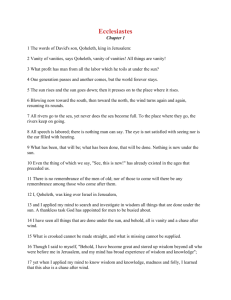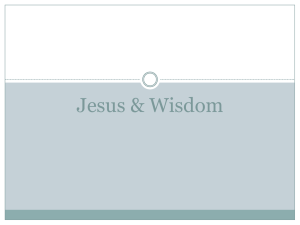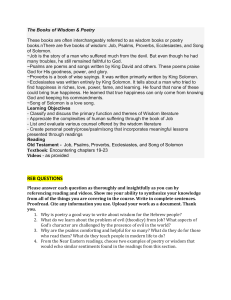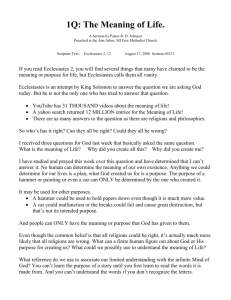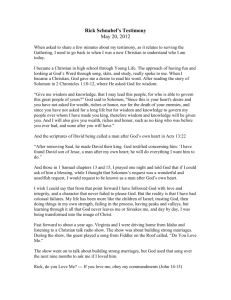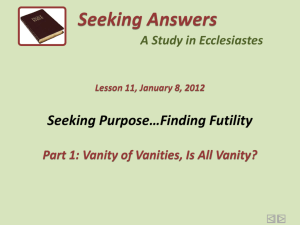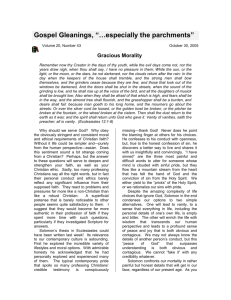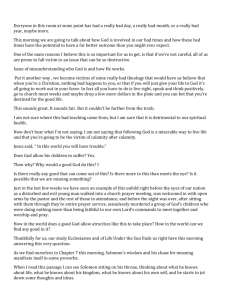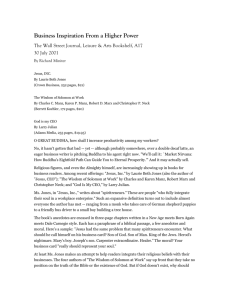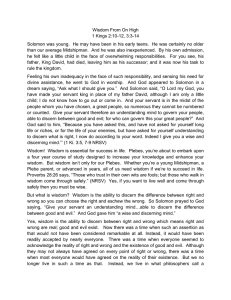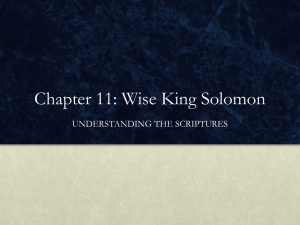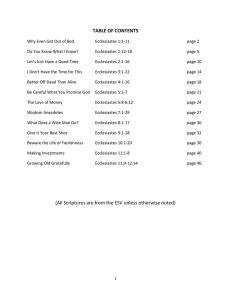Ecclesiastes-Bible-S.. - Trinity Lutheran Church
advertisement
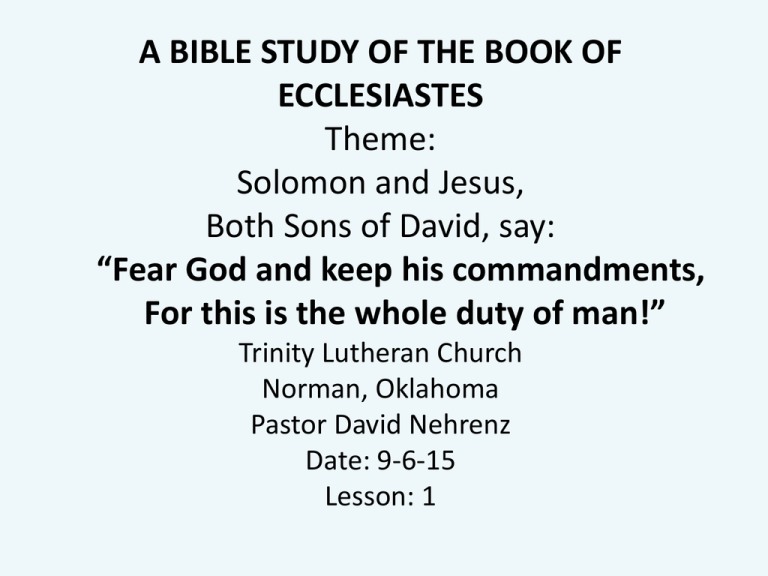
A BIBLE STUDY OF THE BOOK OF ECCLESIASTES Theme: Solomon and Jesus, Both Sons of David, say: “Fear God and keep his commandments, For this is the whole duty of man!” Trinity Lutheran Church Norman, Oklahoma Pastor David Nehrenz Date: 9-6-15 Lesson: 1 A. TEXT (Chapter 1) The words of the Preacher, the son of David, king in Jerusalem. (2) Vanity of vanities, says the Preacher, vanity of vanities! All is vanity. (3) What does man gain by all the toil at which he toils under the sun? (4) A generation goes, and a generation comes, but the earth remains forever. (5) The sun rises, and the sun goes down, and hastens to the place where it rises. (6) The wind blows to the south and goes around to the north; around and around goes the wind, and on its circuits the wind returns. (7) All streams run to the sea, but the sea is not full; to the place where the streams flow, there they flow again. (8) All things are full of weariness; a man cannot utter it; the eye is not satisfied with seeing, nor the ear filled with hearing. (9) What has been is what will be, and what has been done is what will be done, and there is nothing new under the sun. (10) Is there a thing of which it is said, "See, this is new"? It has been already in the ages before us. (11) There is no remembrance of former things, nor will there be any remembrance of later things yet to be among those who come after. (12) I the Preacher have been king over Israel in Jerusalem. (13) And I applied my heart to seek and to search out by wisdom all that is done under heaven. It is an unhappy business that God has given to the children of man to be busy with. (14) I have seen everything that is done under the sun, and behold, all is vanity and a striving after wind. (15) What is crooked cannot be made straight, and what is lacking cannot be counted. (16) I said in my heart, "I have acquired great wisdom, surpassing all who were over Jerusalem before me, and my heart has had great experience of wisdom and knowledge." (17) And I applied my heart to know wisdom and to know madness and folly. I perceived that this also is but a striving after wind. (18) For in much wisdom is much vexation, and he who increases knowledge increases sorrow. A. STUDY NOTES 1. The person and wisdom of King Solomon –called “the Preacher or Teacher” (“Qoheleth” in Hebrew; “Ecclesiastes” in Greek) (1 Kings 3:1-28; 4:29-34; 10:1-8; 2 Chr 9:22-30; Prov 1:1; 10:1; 25:1; Song of Solomon 1:1; Mt 1:6,7; 6:29; 12:42; Lk 11:31; 12:27; Jn 10:23; Acts 3:11; 5:12; 7:47) 2. The time and history of Solomon’s reign (970-931 B.C.) He was the king whom God appointed to build the magnificent first temple on the temple mount in Jerusalem. He was wealthy, intelligent, smart and witty, but would dabble in polytheistic worship because of his 300 wives and 600 concubines. Most scholars think he wrote this book near the end of his life. 3. He emphasizes that life, from the human perspective without God, is empty and futile. Power, prestige, popularity and pleasure cannot fill the void. Man is limited in his ability to make sense out of human existence. He labors and pursues truth and wisdom, but just ends up with more unanswered questions and chasing after wind. 4. Man instead should be patient, admit his limitations, worship and adore God and give thanks for the simple joys of work, peace, wife, children and one’s food and drink. Therefore we should live wisely, prudently before God and others. All good gifts should be received with a thankful heart, since all else is but a breath. (James 1:17; 4:13,14). 5. “Meaningless” = breath. Life is hollow and useless and vain without God. ( John 16:33; Rom 8:18-22) 6. Jesus expands on v. 3 in (Matt 6:19-34; 7:7,8; Mark 8:36-38). The word for God that is used in this book is “Elohim.” 7. Only in the coming Christ can all things become truly “new” (1 Cor 1:30; 5:17; James 3:13-18) 8. Luther lectured on this book: “Let us learn, therefore, to submit ourselves to the counsels of God and to refrain from the cares and thoughts that God has not commanded. There is nothing safer or more acceptable to God than if we refrain from our own counsels and rely on His Word. There we shall find sufficient guidance about what we ought to do. His commands to us are faith, love, and bearing the cross. With these things, I say, we can happily occupy ourselves. Let us deal with everything else as it comes into our hands, leaving to Him the concern about its outcome. But now, because we despise His Word, God punishes us in turn by having us plague ourselves in vain. For God resists in such a way as to prevent the realization either of the good or of the evil that wise men and princes plan to the neglect of the Word. As Ps. 33:10 says, “The Lord brings the counsel of the nations to naught.” Luther, M. (1999). Luther’s works, vol. 15: Ecclesiastes, Song of Solomon, Last Words of David, 2 Samuel 23:1-7. (J. J. Pelikan, H. C. Oswald, & H. T. Lehmann, Eds.) (Vol. 15, p. 25). Saint Louis: Concordia Publishing House. C. LIFE APPLICATION 1.Where do we in the world today see a meaningless chasing after those things that do not truly satisfy? 2.What does the Church, through God’s Word in the Bible, have to offer to mankind that can only be found in God our Creator through Jesus Christ His Son? 3.Why is it essential to teach each generation these truths all over again? 4.When can these truths then actually change people’s everyday lives?
